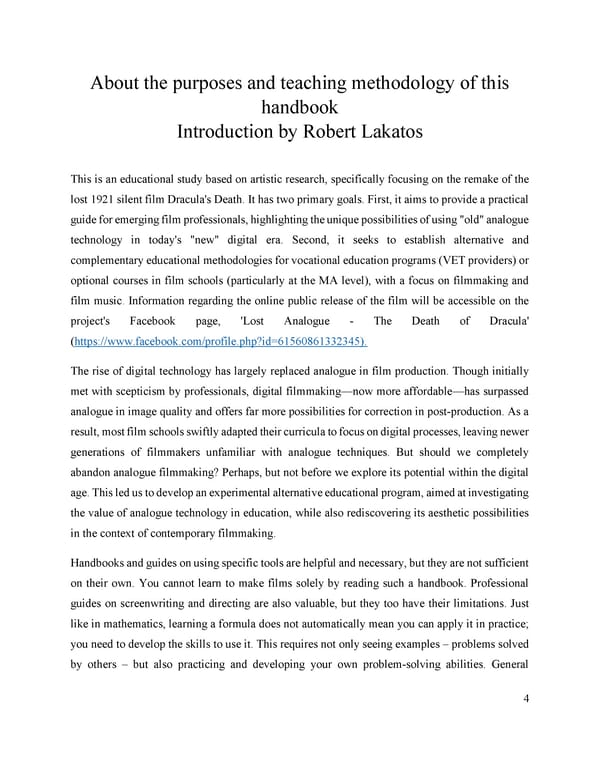About the purposes and teaching methodology of this handbook Introduction by Robert Lakatos This is an educational study based on artistic research, specifically focusing on the remake of the lost 1921 silent film Dracula's Death. It has two primary goals. First, it aims to provide a practical guide for emerging film professionals, highlighting the unique possibilities of using "old" analogue technology in today's "new" digital era. Second, it seeks to establish alternative and complementary educational methodologies for vocational education programs (VET providers) or optional courses in film schools (particularly at the MA level), with a focus on filmmaking and film music. Information regarding the online public release of the film will be accessible on the project's Facebook page, 'Lost Analogue - The Death of Dracula' (https://www.facebook.com/profile.php?id=61560861332345). The rise of digital technology has largely replaced analogue in film production. Though initially met with scepticism by professionals, digital filmmaking—now more affordable—has surpassed analogue in image quality and offers far more possibilities for correction in post-production. As a result, most film schools swiftly adapted their curricula to focus on digital processes, leaving newer generations of filmmakers unfamiliar with analogue techniques. But should we completely abandon analogue filmmaking? Perhaps, but not before we explore its potential within the digital age. This led us to develop an experimental alternative educational program, aimed at investigating the value of analogue technology in education, while also rediscovering its aesthetic possibilities in the context of contemporary filmmaking. Handbooks and guides on using specific tools are helpful and necessary, but they are not sufficient on their own. You cannot learn to make films solely by reading such a handbook. Professional guides on screenwriting and directing are also valuable, but they too have their limitations. Just like in mathematics, learning a formula does not automatically mean you can apply it in practice; you need to develop the skills to use it. This requires not only seeing examples – problems solved by others – but also practicing and developing your own problem-solving abilities. General 4
 Lost Analogue: Exploring Film, Music, and Interdisciplinary Methods in Education Page 4 Page 6
Lost Analogue: Exploring Film, Music, and Interdisciplinary Methods in Education Page 4 Page 6